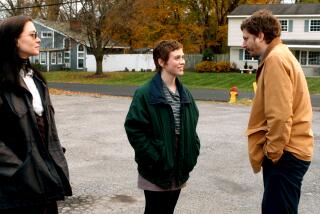Country Kid Ends Up Clueless in the âHood in âWhiteboysâ
To those with a fervent belief in the positive energy of cultural crossover, âWhiteboysâ offers a stern test--if not a hesitant leap--of faith. The movie documents accurately the capacity of pop culture to make mongrels of its consumers. But it doesnât quite know (or want to know) what to make of it.
âWhiteboysâ is basically a travelogue of a glandular state of mind; belonging, in this case, to Flip (co-writer Danny Hoch), a gawky white kid from Iowaâs corn country transfigured by the signals he picks up from MTV and the mallâs record rack into a gold-chain-wearing, slow-walking, quick-rhyming, self-styled âB-boy.â Heâs so deep into âblacknessâ that the mother of Flipâs only African American friend (Eugene Byrd) wonders if heâs Creole.
Flipâs generation of white kids isnât the first to be galvanized by the seeming âfreedomâ of African American culture. Nor is he the first to believe that internalizing some of the broad aspects of this culture entitles him to the assumed âprivilegesâ of outlaw life. His ideas of âbeing whiteâ and âbeing blackâ are informed solely by media images that contrast with the seeming blandness of his daily life.
It never once occurs to Flip that having a bitter, unemployed father and a mother forced to buy groceries with food stamps links him more authentically to the urban street life he finds so glamorous. Nor does it occur to him that the aforementioned black friend, given the choice between being âdownâ with the street action and opting for upward mobility, will choose the latter in a heartbeat. At some point, Flip heads on a road trip to Chicago with his âposseâ to score some drugs. When he comes to the forbidding Cabrini Green housing project, Flip points as if it were the Lincoln Memorial. Does it turn out bad? Hey-yo, do bullets hurt?
Director Marc Levin, whose critically acclaimed âSlamâ showed a far more assured grasp of the Washington, D.C., street subculture it documented, tries to bring some of the same stylistic invention to Flipâs crossover dreams. One amusing morsel of surrealism takes place in Flipâs conception of prison life as one fat power trip, complete with buffet.
But despite the presence of such rap eminences as Snoop Dogg, Slick Rick and Doug E. Fresh, thereâs something about âWhiteboysâ that makes one wonder whether whatâs proclaimed as âhip-hop nationâ really has the goods to transcend as much as it dominates pop culture. Because when all is said and done, Flip doesnât come across as cultural avatar so much as a new subspecies of clueless hick.
* MPAA rating: R, for pervasive language, substance abuse, some violence and sexuality. Times guidelines: violence, crude language and drug abuse.
âWhiteboysâ
Danny Hoch: Flip
Dash Mihok: James
Mark Webber: Trevor
Piper Perabo: Sara
Eugene Byrd: Khalid
Bonz Malone: Darius
Fox Searchlight Pictures presents, in association with BAC Films and Le Studio Canal, an Offline Entertainment Group production. Director Marc Levin. Producers Henri Kessler, Richard Stratton and Ezra Swerdlow. Executive producers David Peipers, John Sloss. Screenplay by Garth Belcon & Danny Hoch and Marc Levin & Richard Stratton, based on a story by Belcon & Hoch. Cinematographer Mark Benjamin. Editor Emir Lewis. Costume designer Carolyn Greco. Executive music producer Steve Gottlieb. Production designer David Doernberg. Art director Amy Silver. Set decorator Dewey Ambrosino. Running time: 1 hours, 29 minutes.
In general release.
More to Read
Only good movies
Get the Indie Focus newsletter, Mark Olsen's weekly guide to the world of cinema.
You may occasionally receive promotional content from the Los Angeles Times.










